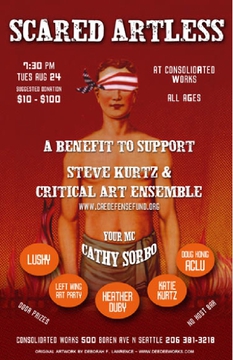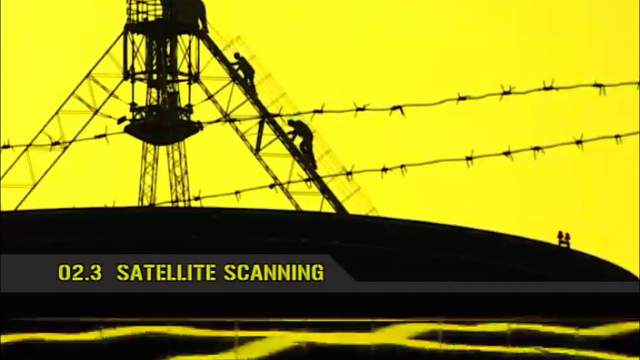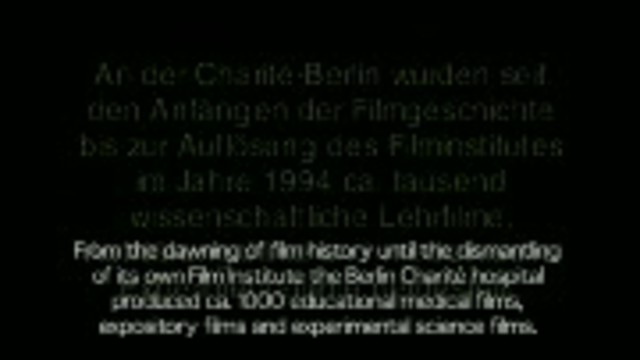Search results for 'science'
http://new . territories / appropriation . of . medical . discourse / art . com
Nina Czegledy and Inke Arns presented the material described in the
following text during the afternoon programme at V2_Organisation
Rotterdam on Sunday, January 21st, 14.00 - 18.00 hrs.
On an imaginary journey in the territories of current medical practice
and visual art, we observe the disintegration of former boundaries and
discover the emergence of a new discourse involving new metaphors and
new mythologies. In the course of this voyage we witness the
crystallization of a process which began in the Enlightenment and today
is linked together by electronic technologies. Mediated by television,
and lately the Internet, the concepts involved here, have contributed
to the construction of a simulated reality in both medical science and
art which imprisons attention and redirects it from the subject of the
activity reproduced.
When Thought Becomes Crime*
March 17th, 2005
How did it come to this?
Only a perverse authoritarian logic can explain how Critical Art
Ensemble (CAE) can at one moment be creating the project "Free Range
Grain" for the Risk exhibition at Schirn Kunsthalle in Frankfurt,
reconfiguring it for The Interventionists exhibition at Mass MoCA in a
second moment, and then suddenly have a CAE member in FBI detention.
The U.S. Justice Department has accused us of such shocking crimes as
bioterrorism, health and safety violations, mail fraud, wire fraud, and
even murder. Now, as we retool "Free Range Grain" for the Risk
exhibition at the Glasgow Center for Contemporary Art, the surreal
farce of our legal nightmare continues unabated.
Oliver Marchart
Since 2006 Oliver Marchart is Professor at the Universtiy of Luzern, 2001-2002 he was Scientific Advisor and Head of the Education Project of documenta 11.
He lectured at different universities (University of Vienna, University
of Innsbruck, Art Academies, Essex Summer School, University of Basel).
Fellowships: Research Fellow at the Centre for Theoretical Studies,
University of Essex (1995); Junior Fellow at the International Research
Center for Cultural Studies in Vienna (1997-1998); Fellow at the
Columbia University Institute at Reid Hall and the École des Hautes
Études en Sciences Sociales, Paris (2005).
Scared Artless
Inke Arns
Inke Arns, curator and artistic director of Hartware MedienKunstVerein (www.hmkv.de) in Dortmund, Germany, since 2005. She has worked internationally as an independent curator, writer and theorist specializing in media art, net cultures, and Eastern Europe since 1993. She lived in Paris (1982-86), finished school in West-Berlin in 1988, studied Russian literature, Eastern European studies, political science, and art history in Berlin and Amsterdam (1988-96) and in 2004 obtained her PhD from the Humboldt University in Berlin, with a thesis focusing on a paradigmatic shift in the way artists reflected the historical avant-garde and the notion of utopia in visual and media art projects of the 1980s and 1990s in (ex-)Yugoslavia and Russia.
ReadFurtherfield
Furtherfield is an artist organisation founded by artists Ruth Catlow and Marc Garrett in 1997
and sustained by the work of its community as the Internet took shape
as a new public space for internationally connected cultural production.
Geert Lovink
Geert Lovink is a media theorist, net critic and activist.
Slashing the Borg: Resistance is Fertile
(C) Mark Dery 1996; all rights reserved; reproduction in any medium without author's written permission forbidden.
Organisation of the Organisationless
Collective Action After Networks
Part of the PML Books series. A collaboration between Mute and the Post-Media Lab.
The Information war
Humanity has always invested heavily in any scheme that offers escape from the body. And why not? Material reality is such a mess. Some of the earliest "religious" artefacts, such as Neanderthal ochre burials, already suggest a belief in immortality. All modern (i.e. post-paleolithic) religions contain the "Gnostic trace" of distrust or even outright hostility to the body and the "created" world. Contemporary "primitive" tribes and even peasant-pagans have a concept of immortality and of going-outside-the-body (ec-stasy) without necessarily exhibiting any excessive body-hatred. The Gnostic Trace accumulates very gradually (like mercury poisoning) till eventually it turns pathological. Gnostic dualism exemplifies the extreme position of this disgust by shifting all value from body to "spirit". This idea characterizes what we call "civilization".
ReadIn solidarity with Library Genesis and Sci-Hub
In Antoine de Saint Exupéry's tale the Little Prince meets a businessman who accumulates stars with the sole purpose of being able to buy more stars. The Little Prince is perplexed. He owns only a flower, which he waters every day. Three volcanoes, which he cleans every week. "It is of some use to my volcanoes, and it is of some use to my flower, that I own them," he says, "but you are of no use to the stars that you own".
ReadEric Kluitenberg
Eric Kluitenberg is an independent theorist, writer, and organiser on culture, media and technology. He is the editor-in-chief of the Tactical Media Files, and a Research Fellow at the Institute of Network Cultures (2013). He teaches media theory and history at the Art/Science Interfaculty in The Hague.
ReadOccupy and UK Uncut: the evolution of activism
Occupy Sandy gained the attention denied to Occupy Our Homes because it replaced militant Occupy! with "do-it-yourself" Occupy. Feel-good mutual aid displaced attention from the underlying contradiction between public housing and private utilities onto the quick fix of digital media. Occupy Our Homes, on the other hand, confronts the system with its failures ? predatory lending, homelessness, and empty bank-owned houses. The problems it addresses can't be solved by rolling up our sleeves and getting involved; they require political solutions.
ReadTandem Surfing the Third Wave: Part 3
This interview was conducted between subRosa and Ryan Griffis via email correspondence during the first half of 2003.
Disruption Network Lab #2: Cyborg
Second Event of the Disruption Network Lab In cooperation with Kunstraum Kreuzberg /Bethanien
Kunstquartier Bethanien, Studio 1, Mariannenplatz 2, Berlin, May 29-30, 2015.
This two days event presents keynote speeches, panels and live cinema connected with the understanding of cyborg identities, while exposing power structures embedded in technology and our everyday life. The event is built around the international book launch of The Cyborg: A Treatise on the Artificial Man, written by political Sci-Fi theorist Antonio Caronia (Genoa, 1944 – Milan, 2013), published by Meson Press / Hybrid Publishing Lab, Leuphana University of Lüneburg. Starting from the book of Caronia and going beyond it, the analysis will culminate discussing the most recent frontiers of biotechnology and transhumanism.
Change for the Machines
'CYBERPOSITIVE'
O(rphan) d(rift>)
Cabinet Editions
ISBN 0-952-58240-6





